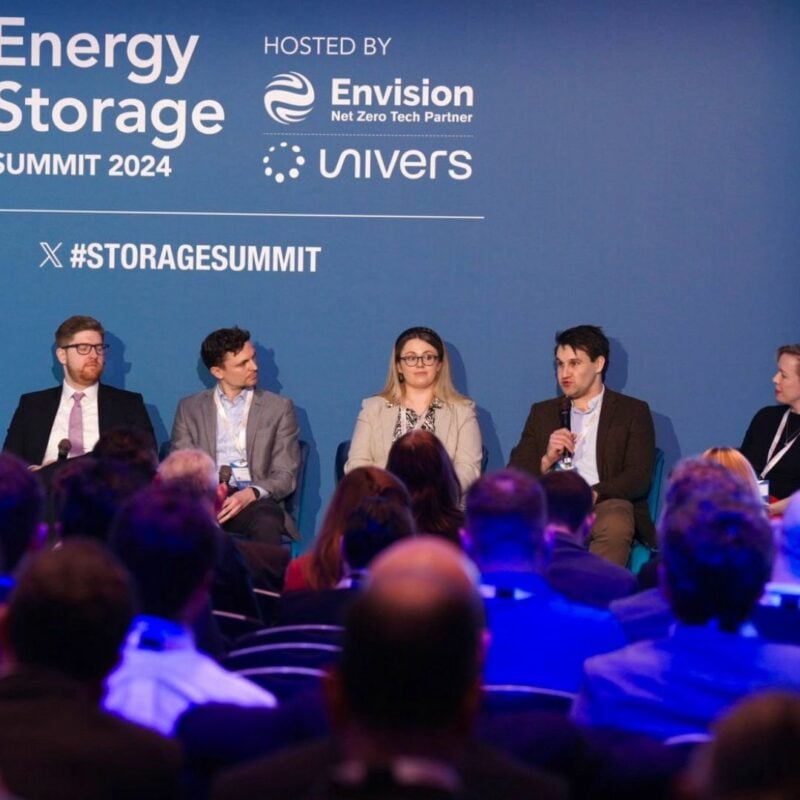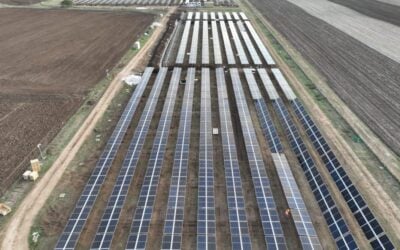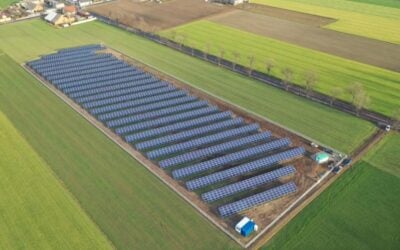
Battery storage systems are “perhaps the most complex energy asset to optimise” from a market perspective, but the UK industry is handling those challenges.
That’s the assessment of Tom Palmer, head of business development at Zenobe Energy, a battery energy storage system (BESS) developer-investor, speaking this morning at the Energy Storage Summit EU in London, UK.
Enjoy 12 months of exclusive analysis
- Regular insight and analysis of the industry’s biggest developments
- In-depth interviews with the industry’s leading figures
- Annual digital subscription to the PV Tech Power journal
- Discounts on Solar Media’s portfolio of events, in-person and virtual
The panel took place on the second day of the event, hosted by our publisher Solar Media. Chaired by Louise Dalton of law firm CMS, the session, ‘UK BESS: Reviewing the policy landscape in detail’ focused on how the industry can stay “at the forefront of the energy transition,” Dalton said.
The UK is widely considered an international leader in battery storage development, both from the viewpoint of deployment figures and in terms of market maturation, with a fleet of around 6.5GW large-scale assets in operation.
“In 2023, we saw a huge build-out of energy storage in the UK, lots of developer and investor interest, including some of the biggest players in the market,” Dalton said.
However, the present moment is characterised by a winter period that has been; Dalton said, “disappointing in terms of revenues”.
Against that backdrop, the lawyer said, the market is facing a gamut of policy changes. Some of these will be very significant and long-term, such as the ongoing Review of Electricity Market Arrangements (REMA) or support mechanisms for long-duration energy storage (LDES).
At the same time, there are changes coming that may resemble “tweaks” or minor adjustments but will nonetheless have a significant impact in their own right.
Well-timed Capacity Market chat
Dalton canvassed views from the assembled panelists on some of those topics, starting with this morning’s big reveal of the T-1 Capacity Market (CM) auction results, which you can read about on our sister site Solar Power Portal.
Georgina Morris, head of capacity market policy and low-carbon networks for the UK government Department of Energy Security and Net Zero (DESNZ), remarked that the clearing prices offered an uplift to the typical BESS revenue stack, taking average revenues from £51k (US$64.4k)/MW/yr to £65k/MW/yr with CM revenues factored in.
So while it isn’t the biggest portion of a stack by far, it is a guaranteed contracted payment that is a useful contribution, particularly in today’s high interest rate environment, Morris said.
Zenobe Energy’s Tom Palmer noted, however, that in terms of the T-4 auctions for delivery further out, some winners of contracts won’t even progress their projects to the build stage if they aren’t able to close financing.
There are proposals to reform the CM, which could include splitting the market into separate low-carbon and carbon-intensive asset pools, Lewis Heather, a director at management consultancy Baringa Partners said.
In addition, the original design of the CM was to cover stress events that may have lasted a few hours, but in future, the market will need capacity for different use cases, such as long periods of low renewable production. Meanwhile, the inclusion of new technologies such as carbon capture might impact the business case for BESS CM units.
DESNZ’s Georgina Morris said that while CM reform may be significant in the long-term, it is “incredibly important” that the current framework be allowed to continue in the meantime. Julian Jansen, markets and policy director at system integrator Fluence added that it is “critical” that CM design does not lock-in dependency on carbon-intensive technologies.
Balancing Mechanism
The Balancing Mechanism (BM), the real-time supply and demand matching tool wielded by the UK’s National Grid Electricity System Operator (ESO), has long been seen as a key opportunity for battery storage that is largely untapped.
While the reasons for that have been well documented on this site as well as on our UK sites Current and Solar Power Portal, Zenobe’s Tom Palmer said that the new Open Balancing Platform launched by the ESO will help to overcome the limitations of a BM which was designed around legacy assets.
It will take a lot of time and “the changes required aren’t simple,” Palmer said, but it is important to move fast, because time is money and in this case that money is coming from the UK’s consumers.
The ESO is introducing 15-minute settlement periods, Palmer said, “which is great,” but has come very late and is perhaps not ambitious enough. This feels especially acute, given that 5-minute settlement (5MS) has already been introduced into the National Electricity Market (NEM) in Australia, moderator Louise Dalton said.
Innovations and new revenues add complexity
The UK now has a plethora of ancillary services market opportunities and other revenue streams for BESS operators to add to their stack, including a new frequency service, Balancing Reserve.
While Fluence’s Julian Jansen said that this and other recent developments mean the complexity of the market is increasing in a way that developers maybe don’t need or want to have to deal with, Zenobe’s Tom Palmer said the industry “can deal with that complexity”.
“I’m not so worried about the complexity in some senses, because I think the industry can deal with it. I think the optimisers are able to go and optimise in different markets, they’re able to understand that,” Palmer said.
“I don’t see that as a kind of a barrier [to the business case].”






